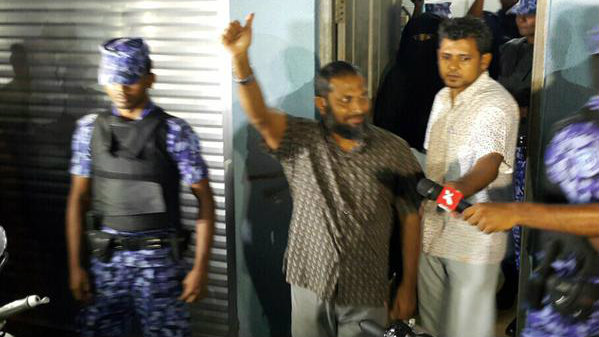Sheikh Imran Abdulla, the president of the religious conservative Adhaalath Party, was taken back into police custody this evening, just a day after the chief judge of the criminal court authorized his transfer from a high security prison to house arrest.
Judge Abdul Bari Yoosuf cited a secret police intelligence report at today’s surprise hearing in authorizing Imran’s transfer to police custody.
“We could not make any arguments in our defence, because we do not know what was said in the intelligence report,” Imran’s lawyer Ali Zahir told the press tonight.
Imran is charged with terrorism and is accused of inciting violence against the police at a historic antigovernment protest on May 1.
Zahir said the Home Ministry has not informed Imran’s family or lawyers of his whereabouts yet.
Bari’s decision today points to rifts within the criminal court. According to Zahir, Bari had said Chief Judge Abdulla Mohamed’s Wednesday ruling contravened procedures normally followed by the court.
A separate row also broke out on Wednesday between Judge Abdulla and Prosecutor General Muhthaz Muhsin. The pair are quarrelling over the nature of charges pressed against some 13 individuals accused of beating a police officer on May 1.
Baseless intelligence reports
Judge Bari is one of the three judges who first presided over Imran’s trial.
At the first hearing on June 2, the panel ruled Imran be kept in custody until a verdict is issued. On June 8, two of three judges were promoted to the High Court. The trial has been stalled since.
The chief judge appoints new judges if there is a change in the panel. But Bari convened today’s formal hearing even though a new bench was not reconstituted.
Zahir criticized Bari’s use of a secret police intelligence report: “Intelligence reports have now become a tool to take unjust punitive measures and keep opposition politicians in custody.”
According to Zahir, Bari had declared today’s hearing to be a formal hearing and not a remand hearing. Intelligence reports could not be used as evidence at formal hearings, he contened, as it is written in the report itself that it cannot be used in a formal court of law.
Zahir went on to express concern over the increasing use of intelligence reports in trials against politicians and protesters, including the trial of a former defence minister on weapons smuggling charges. The lawyer also questioned the validity of some reports.
During the May appeals of the criminal court’s decision to extend the remand detention of three key opposition figures who were arrested along with Imran, a High Court judge had inadvertently revealed the contents of the intelligence report to be public speeches made at the May Day protest, he said.
Zahir argued Imran’s detention in state custody is unwarranted as he is being charged with terrorism for a public speech. He also said the home ministry’s decision on July 23 to hold Imran in a high security prison is unlawful.
The Maldives Correctional Services has said the transfer is legal under the Prisons and Parole Act. But Zahir pointed out that the Maafushi Jail is not listed as a remand center by the Home Ministry.
The High Court in May transferred Imran to house arrest citing medical concerns. He has diabetes and high blood pressure and cholesterol. At the time, he had been in police custody for 26 days.
He was released on the same day by the Criminal Court, but was arrested again on June 1.
Imran’s transfer to the prison occurred on the same day rumors swirled in the capital Malé that he may be transferred to house arrest, as part of a deal between the main opposition Maldivian Democratic Party (MDP) and the government.
A pardon for former President Mohamed Nasheed was also expected on July 23 as part of the same deal. Instead, the Prosecutor General Muhthaz Muhsin said he would appeal Nasheed’s terrorism conviction.
Nasheed was found guilty of ordering the military detention of Judge Abdulla in 2012. His trial was overseen by the same three judge panel that presided over the first hearing in Imran’s case.
The opposition leader’s 13-year jail term was commuted to house arrest on July 19.
The MDP has urged the government to honour its commitments to release all jailed politicians.



















